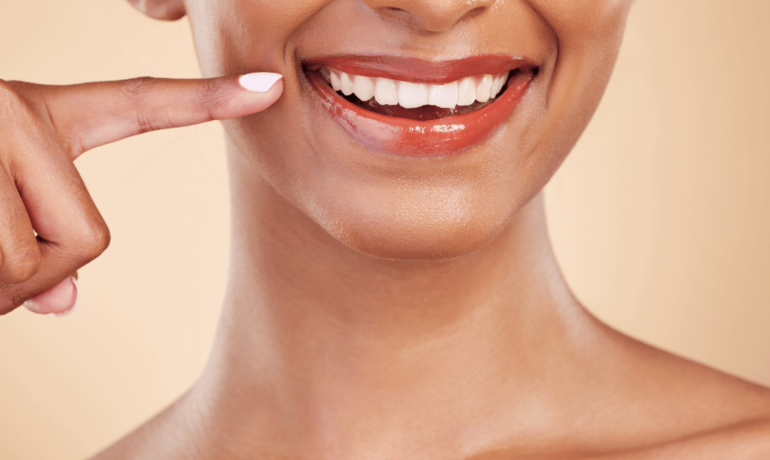Most young professionals nowadays love their daily cup of coffee and enjoy red wine on the weekends. Having a bright smile can boost their confidence at work and in social settings. However, most people feel anxious about which whitening option to choose and whether teeth whitening will be safe yet effective in the long run.
Don’t worry, you are not alone. But here’s some good news, most teeth whitening methods are considered safe. In fact, a study found that these treatments are generally effective and safe for most people.
Still, it’s important to know about the possible long-term effects of teeth whitening. This article will guide you through the different teeth-whitening options, their safety, and everything that you should be aware of about their long-term effects.
The Science of Teeth Whitening
You must understand that your habits, your lifestyle, and your diet can greatly contribute to the discoloration of your teeth.
Smoking can lead to yellowing. While coffee, wine, and other high-pigmented food and drinks hang out on the surface of your teeth. Due to their strong colors, these foods and drinks can quickly discolor your teeth.
Then there are stains caused by things like medications or just getting older. Poor oral hygiene can lead to plaque buildup which can damage your teeth and make your teeth appear yellowish.
To save your teeth from this problem, your cosmetic dentist in Upland California can help you. You may go for hydrogen peroxide bleaching, or laser whitening. Or you may also use DIY home whitening strips and gels or toothpastes specially made to whiten your teeth.
Most dental professionals recommend whitening your teeth no more than once or twice a year. Its effects can last from a few months up to three years. This greatly depends on your habits, lifestyle, and diet.
What Whitens the Teeth?
Hydrogen peroxide plays a vital role in the whitening process. This whitening solution breaks down quickly when applied to your teeth. This gel makes contact with your teeth, creating free radicals or tiny scissors that target stain molecules. These free radicals break down stains into smaller pieces. The smaller the stain molecules, the less color they absorb, making your teeth appear whiter.
Whitening treatments primarily target the enamel. It is the hard, outer layer of the tooth that protects the inner dentin layer. If your enamel becomes thin it can lead to tooth sensitivity and tooth decay. It will also expose the dentin. Since the dentin has a natural yellow color, it will make your teeth appear discolored.
Though teeth whitening is generally good for your teeth, too much might damage your teeth. Overusing whitening treatments can damage the enamel, leading to increased tooth sensitivity and potential gum damage. To ensure safety, whiten your teeth with the help of your Upland dentist. They use safe bleaching agent concentrations and keep an eye on the process to prevent adverse effects. Using products with lower peroxide concentrations and closely following directions can help reduce dangers when using at-home treatments.
In-office Teeth Whitening and Its Long-term Effects
There are two latest types of in-office teeth whitening Zoom and laser teeth whitening. Both treatments are administered by dentists and are known for their effectiveness in achieving noticeable color changes in a relatively short time.
After just one session, the high-concentration bleaching gels utilized in these procedures can result in significant whitening. Following treatment, patients often notice an obvious change in tooth color, which gets better over the next several days as the teeth settle.
Depending on individual habits and care, these results may have varied longevity. The results of in-office whitening usually last for three years, but sometimes they last for a few months. The patient’s diet, oral hygiene habits, and tobacco product use are all factors that affect how long this takes. Over time, consistent care and proper oral hygiene might help maintain the bleaching results.
Before you get an in-office teeth whitening procedure, there are some things to consider. Though this method is safe and effective you must know some known potential long-term effects.
- It may cause increased tooth sensitivity as the bleaching agents penetrate the enamel and dentin. This sensitivity typically diminishes once the treatment concludes.
- Gum irritation may occur if the whitening gel contacts gum tissue, causing temporary inflammation or white spots, which usually resolve within days.
- Uneven whitening results can occur due to inconsistent product application or variations in tooth structure or prior dental work responses.
OTC Teeth Whitening: Long-Term Effects
Over-the-counter (OTC) teeth whitening products offer a convenient way to lighten tooth color at home, but their effectiveness and longevity differ from professional treatments.
OTC products contain lower concentrations of bleaching agents like hydrogen peroxide compared to those used in professional settings. This results in a gradual lightening effect over several weeks of consistent use, rather than the immediate results seen with professional treatments.
The longevity of OTC whitening results typically ranges from a few weeks to a few months. This duration can vary based on factors such as the type of product used, individual response to whitening agents, and lifestyle habits such as diet and smoking.
Unlike professional treatments that can last up to three years, OTC whitening requires ongoing use to maintain results.
However, there are potential long-term effects associated with OTC whitening products. According to a study published in the International Journal of Research and Review, prolonged use or misuse of these products can lead to increased tooth sensitivity and gum irritation.
Enamel erosion is also a concern if products are used improperly or excessively. Users need to follow instructions carefully and consult with a dentist if experiencing any adverse effects.
Anxious about potential harmful effects? You can easily mitigate them with the following steps.
Mitigating Long-term Adverse Effects
The best way to mitigate long-term adverse effects is by visiting your Upland dentist.
Dentists ensure safe teeth whitening by using gum barriers during treatments to protect sensitive gum tissue from the whitening agent. The approach reduces the risk of irritation and inflammation. They also carefully apply the bleaching agent to avoid uneven whitening and potential enamel damage.
Avoid Stain-inducing Foods and Beverages
After teeth whitening, you should avoid staining foods and drinks like coffee, tea, and red wine for 24-48 hours. Using a straw can further minimize contact with teeth. To manage tooth sensitivity post-whitening, you can use desensitizing toothpaste and may benefit from fluoride treatments or mouth rinses recommended by your dentist.
Maintain Good Oral Hygiene
Maintaining good oral hygiene with gentle toothpaste and daily flossing helps prolong whitening results and prevents plaque buildup.
Regular dental check-ups are essential to monitor oral health and assess the longevity of whitening results. Dentists can promptly address any concerns and suggest touch-up treatments as needed.
Want to keep your teeth in excellent condition after a teeth whitening procedure? Here are more tips and recommendations on food and teeth whitening aftercare.
Teeth Whitening in Upland CA
Achieving your desired teeth whitening results can significantly boost your confidence across all aspects of life. Imagine wearing that bright, confident smile during a job interview. It may not entirely impress your interviewer, but it will surely leave a lasting impression.
So, are you looking for a reliable cosmetic dentist in Upland, California? A skilled cosmetic dentist like ours in Upland Dental Care can help you achieve the smile of your dreams. Whether you’re looking to brighten your teeth, correct imperfections, or enhance your overall appearance, we got you!
Take the first step toward achieving your dream smile by reaching out to experts who can provide valuable guidance and assistance.
Talk to our Cosmetic Dentist


